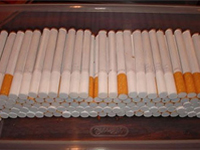Commercial RYO machine operators must comply with the new rules effective immediately.
On Friday, July 6, President Barack Obama signed the transportation bill, passed by the U.S. House of Representatives and the U.S. Senate, into law.
The bill included a provision that defines commercial RYO machine operators as tobacco manufacturers under federal law. This means that the commercial RYO machine provision went into effect on July 6, 2012, the National Association of Tobacco Outlets (NATO) reported.
Commercial RYO machine operators, as of July 6, now must comply with the new rules, which include, but are not limited to:
1. Every person, before commencing business as a manufacturer of tobacco products, must apply to the TTB for a permit to engage in such business and file a bond.
2. Manufacturers of tobacco products are required to keep records, submit reports, and take inventories of tobacco products.
3. The tobacco products that are manufactured must be put up in packages that bear required marks and labels.
4. The federal cigarette tax of $1.01 per pack must be paid on manufactured cigarettes.
5. The Surgeon General cigarette health warnings must be affixed to cigarette packaging.
6. The FDA rules on cigarettes including minimum package size, the prohibition of flavored cigarettes, and cigarette sampling must be followed.
The new language amending the Internal Revenue Code’s definition of “tobacco manufacturer” now includes commercial roll-your-own machine operators.
26 United States Code Section 5702(d): “Manufacturer of tobacco products” means any person who manufactures cigars, cigarettes, smokeless tobacco, pipe tobacco, or roll-your-own tobacco, except that such term shall not include—
(1) a person who produces cigars, cigarettes, smokeless tobacco, pipe tobacco, or roll-your-own tobacco solely for the person’s own personal
consumption or use, and
(2) a proprietor of a customs bonded manufacturing warehouse with respect to the operation of such warehouse.
Such term shall include any person who for commercial purposes makes available for consumer use (including such consumer’s personal consumption or use under paragraph (1)) a machine capable of making cigarettes, cigars, or other tobacco products. A person making such a machine available for consumer use shall be deemed the person making the removal as defined by subsection (j) with respect to any tobacco products manufactured by such machine. A person who sells a machine directly to a consumer at retail for a consumer’s personal home use is not making a machine available for commercial purposes if such machine is not used at a retail premises and is designed to produce tobacco products only in personal use quantities.
Source: NATO




